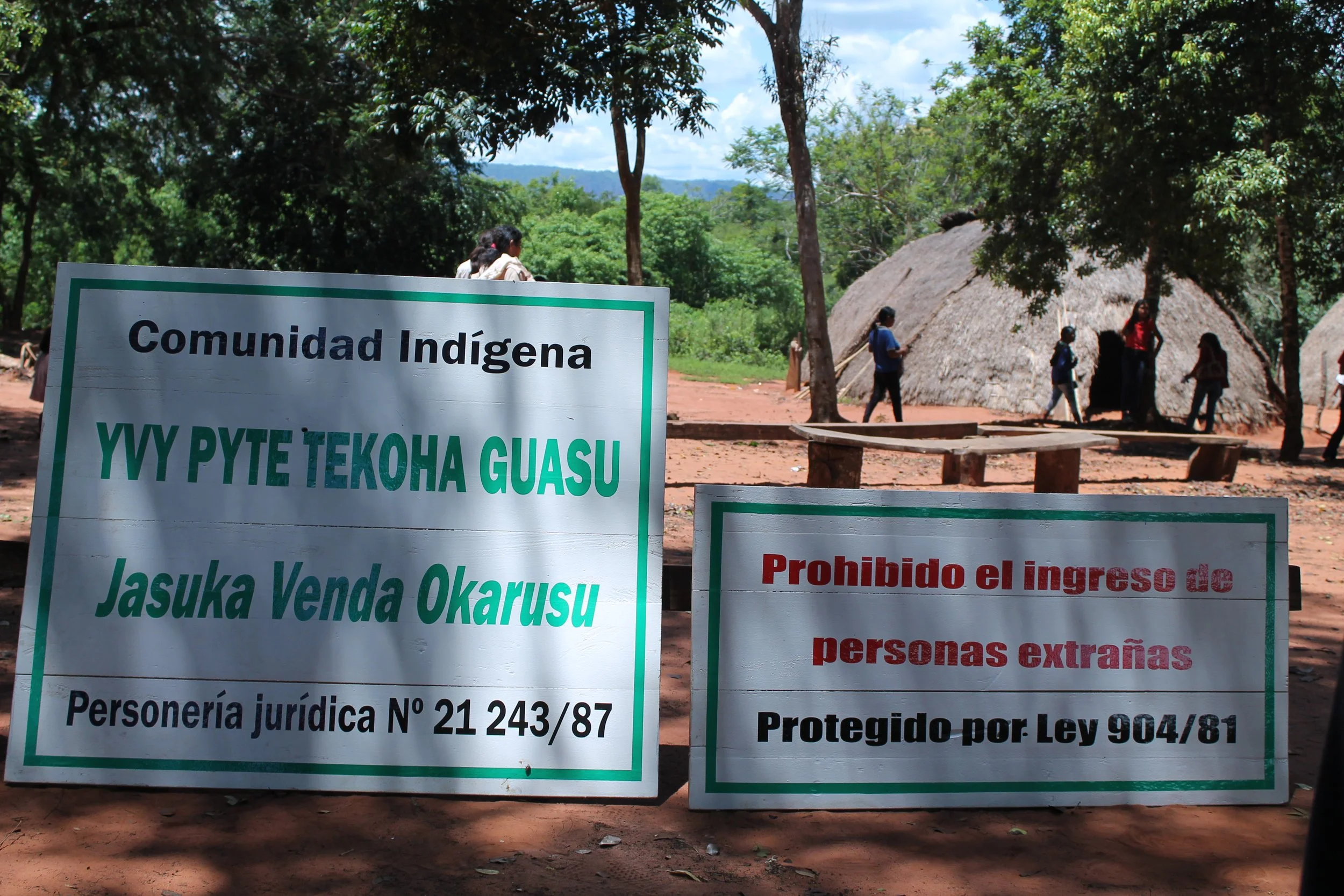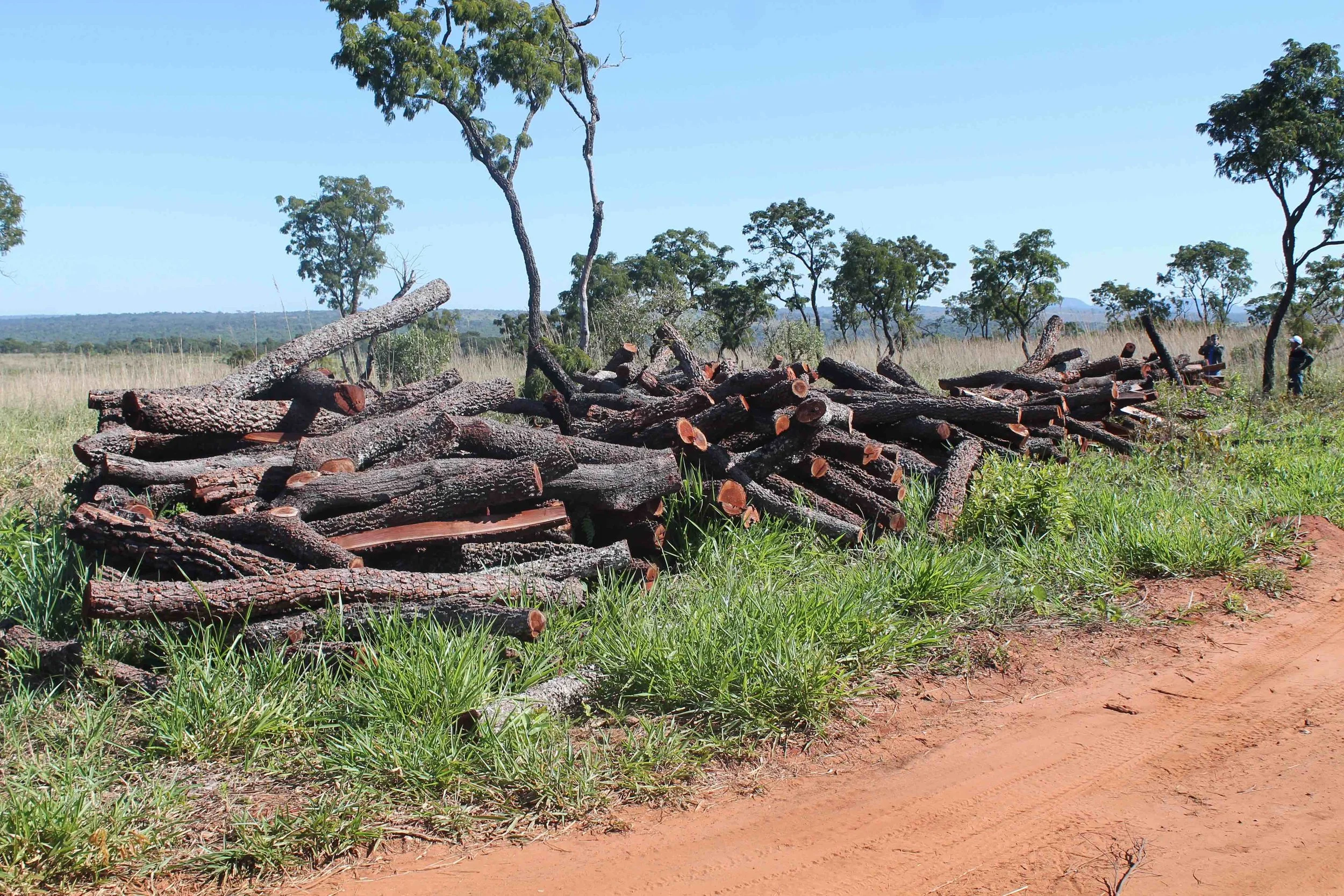How Paraguay’s ancient forests became a crime scene
Members of Yvy Pyte examine a map of their territory during a community meeting in January, 2023. Photo: William Costa.
Reportage • November 16, 2023 • William Costa • Leer en castellano
Just over three weeks ago, Arnaldo Benítez Vargas, a spiritual leader of the Guarani Paĩ Tavyterã Indigenous people, was murdered in his home community of Yvy Pyte in northeastern Paraguay.
The horrific crime came as an escalation of fierce violence against the inhabitants of Yvy Pyte, who face an unprecedented criminal invasion of their ancestral territory. Benítez Vargas, one of those responsible for the transmission of ancestral knowledge and for leading sacred chants during ceremonies, was killed for his opposition to the land theft, according to community members.
With Paraguayan state institutions consistently failing in their duty to protect Paĩ Tavyterã lives and territories, leaders fear that the violence will continue to intensify.
“The loss of our spiritual leader is irreparable; there are fewer and fewer spiritual leaders in our communities”, said Andrés Brítez, a leader of Yvy Pyte, in Guarani during a phone interview. “Conditions are continually deteriorating and we are living in worsening fear. It is a not-so-silent genocide”.
Despite these terrifying circumstances, and while living in the long shadow of drug cartels and other armed groups in northeastern Paraguay, the members of Yvy Pyte endeavour to deploy communal strategies of struggle to protect their land and their very way of being.
At the centre of the earth
Yvy Pyte, located in Paraguay’s Amambay administrative department, has been inhabited since time immemorial by the Paĩ Tavyterã, who are one of five Guarani Indigenous peoples in Paraguay. Yvy Pyte is one of the few remaining tekoha guasu, the large ancestral territories of the Paĩ Tavyterã.
Home to some 500 families, the community has special importance as it sits at the entrance to Jasuka Venda, the Paĩ Tavyterã’s most sacred site, a mount where they believe creator god Ñane Ramõi Jusu Papa brought himself and the world into existence.
“Yvy Pyte is an ancient tekoha ypy [community of origin]. Ñande Ramói Papa left it to us for us to live in”, said Brítez.
The relentless expansion of cattle ranching across Paraguay’s northeast has left Jasuka Venda and Paĩ Tavyterã communities like Yvy Pyte as some of the final islands of native forest, making them clear targets for those looking to acquire land for the illegal extraction of valuable woods and to establish further pasturelands.
This pressure adds to the multiple threats already faced by Indigenous peoples in Amambay, which sits on the border with Brazil. Powerful drug cartels from the neighbouring country operate in the department, and the Paraguayan People’s Army (EPP) illegal armed group have clashed with state forces in the area of Indigenous communities.
The Paĩ Tavyterã have frequently been victims of violence playing out in and around their territories. In October 2022 two Paĩ Tavyterã men, one an important leader, were killed in an event involving the EPP and state forces at Jasuka Venda.
Signs to be erected at the entrance to Yvy Ptye. The sign on the right prohibits unknown people from outside the community from entering. An oypysy (temple) is seen in the background. Photo: William Costa.
Three years of invasions in Yvy Pyte
The extreme pressure on Paĩ Tavyterã land, culture and lives is all too clear at Yvy Pyte, located 80 kilometres from departmental capital Pedro Juan Caballero. Travel to the Yvy Pyte means taking a 50-kilometre stretch of rugged dirt road that passes near the towering rocky hills of Amambay. The influence of neighbouring Brazil often feels stronger than that of national capital Asunción, located over 400 kilometres away.
Since 2020, armed invaders have been entering the community to fell native trees using heavy machinery, and erecting fences using the hard, knobbled trunks of felled kurupa’y trees. The gunmen relentlessly terrify residents with gunfire while steadily destroying the forest and enclosing the land.
Leaders say that the invaders, in an attempt to legitimise their theft, have obtained falsified property deeds to almost 2,000 hectares of the 11,000 hectares of land that are legally recognized as forming part of communally owned land that cannot be bought or sold. The practice of property deed falsification is all too common in Paraguay, where official figures state that 20 per cent of registered properties do not actually exist.
“The Paraguayans have historically stripped us of our land, and this continues,” said Brítez, signalling that the Paĩ Tavyterã are the “elder siblings” of Paraguayans, given that they predate the existence of the state, a fact recognized in the nation’s constitution.
This extreme threat to the land is devastating for the Paĩ Tavyterã. As well as stripping families of their homes and crops, the invasion threatens their ability to use the forest to obtain food, ancestral medicines, and building materials, and puts their spiritual life, and their very way of being (teko) in danger. Furthermore, it is a direct violation of an environmental law prohibiting deforestation in the eastern half of Paraguay.
“It’s terrible for us that they destroy the trees. We pray to the trees and speak to them before touching them. These strangers come in and destroy everything without any care”, said Nora Rosati, a Yvy Ptye leader, in Guarani in a phone interview from her home in the community. “It hurts because the trees are like us; they feel”.
“The institutions must respect us”
The community has continually pressured state institutions for their rights to be upheld, filing numerous legal complaints, including a report of the genocidal characteristics of the invasion as it breaks up Yvy Ptye.
Community leaders relentlessly grapple with suffocating bureaucracy that is made all the more complicated by the exclusion of Guarani—spoken by the Paĩ Tavyterã and most of the Paraguayan population—despite its position as an official language.
Institutions such as the chronically underfunded Paraguayan Indigenous Institute (INDI), which is responsible for issues related to Indigenous communities, have been highly unresponsive. The INDI has repeatedly proved reluctant and excruciatingly slow to mobilize its staff from their headquarters in the capital Asunción to Yvy Pyte.
“The institutions, the people from the INDI, have tricked us many times. They don’t respect us; they must now respect us”, said Rosati.
Delays in receiving official responses have played into the hands of the invaders, who have been able to secure legal backing for their falsified documents while continuing with the destruction.
The violation of Indigenous land rights is a widespread problem in Paraguay. Despite constitutional guarantees, more than half of the country’s approximately 500 Indigenous communities (belonging to a total of 20 Indigenous peoples) are landless or see their lands threatened. In addition, legislation was recently passed to make evictions of vulnerable communities easier, unleashing a wave of violent removals by state forces in favour of powerful individuals and companies.
In communities like Yvy Pyte, the current threats form part of a much longer history of struggle to protect their territory in the face of official violence and negligence. The community has spent decades fighting to receive property deeds for the entirety of the 11,000 hectares legally recognised as part of their territory. Even so, the current invasion is taking place in an area for which the community has deeds.
“It’s a historical struggle dating from the1940s and 50s, when we had the first contact with the Paraguayan government,” said Brítez from his home in Yvy Pyte. “When our relation with the state began, our land problems began, and to this day they have not been solved.”
Marked institutional racism towards Indigenous people was exemplified by the reaction to the murder of Benítez Vargas, who was killed by another Indigenous man who lived in the community. While community members repeatedly stated that the murder had been orchestrated in response to Benítez Vargas’s resistance to the land invasion, the police reported the crime as the result of a drunken fight between Indigenous men.
This has been an ongoing characteristic of the invasion: the invaders have made efforts to turn community members against one another and systematically destroy the social fabric. This has been done through a series of deceitful plots, false information, and by taking advantage of the extreme necessities of the families. This level of intrigue makes the invasion an unprecedented attack on the community, allowing institutions to view the tragic events as simply an internal community conflict.
A pile of illegally felled kurupa'y trees at Yvy Pyte. Photo: William Costa.
Determined, collective resistance
In the face of these external and internal difficulties, members of Yvy Pyte are showing determined resistance to the invasion. While their strategies are often limited by the extreme dangers that surround them and the lack of support from institutions, they continue to struggle through enormous effort and at great cost, often putting their lives in danger.
“Our struggle is collective. It is based on dialogue to reach internal agreements: ñomogueta pora [to dialogue well],” said Rosati.
This dialogue often takes place through community communication networks. Despite the fact that the majority of people in Yvy Pyte do not own smartphones, there is a remarkable flow of information about happenings through in-person meetings and phone calls. Children form a vital part of these networks, and their information and observations are often taken to community assemblies by female leaders.
The assemblies themselves are spaces for collective decision-making by consensus. All men and women are able to speak and share opinions while children listen attentively as part of their learning process. They are spaces for strengthening the community’s teko.
Rosati added that communication with groups and organisations outside the community was also of great importance: “We have a support network that supports us in the struggle,” she said. “That really motivates us”.
Yvy Pyte leaders have participated in meetings with the Kaiowa Indigenous people, who are their close relatives across the border in Brazil. They also have the support of Paraguayan Indigenous organisation Federation for the Self-Determination of Indigenous Peoples (FAPI), Paraguayan NGOs, and international NGOs like Cultural Survival.
Within assemblies, decisions are taken regarding actions to protect the land. This includes the organization of patrols by groups of men from the community to monitor conditions around the territory. These patrols have often been limited by the extreme danger represented by the armed invaders and the cost of petrol for the motorbikes and chainsaws used.
In the absence of efforts from state institutions to repair the physical and environmental damage suffered by the community, members have also carried out numerous actions against infrastructure erected by the invaders, repeatedly removing gates that have been put up without their permission, only to find them subsequently put up again and their own gates taken down.
“We have put up signs to prohibit people from entering: the invaders tore them all down. They’ve destroyed our gate about eight times this year,” said Brítez.
“The leaders have received death threats, and the children are entirely unsettled,” he said, reflecting on the danger facing the community. “Given that there is so much impunity, we are also worried that they will just grab more land.”
Members of Yvy Pyte are also extremely concerned about what the invasion may mean for the future of the Paĩ Tavyterã people more broadly.
“This could happen in other places: a terrible precedent is being set through the lack of justice,” Rosati said. “Even Jasuka Venda, the sacred mount of Yvy Pyte, is threatened. We must all stop what is happening here so that we can all be protected.”
For Brítez, the struggle is vital in order to guarantee the continuation of the millennia-old presence of the Paĩ Tavyterã at Yvy Pyte.
“We want the future generations to see that we left them something… the land, the forests, so that they can live in peace, and so they can live well by the teko,” he said.




